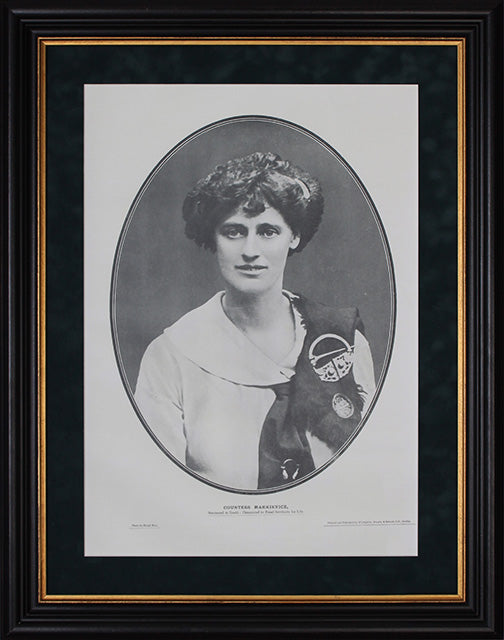The Walton Collection
Countess Markievicz - 1916 Poster
Countess Markievicz - 1916 Poster
Couldn't load pickup availability
A very rare Constance Georgine Markievicz 1916 commemorative poster. Constance Georgina Markievicz , née Gore-Booth, was born on the 4th February 1868 . Known as Countess or Madame Markievicz, she was a politician, revolutionary nationalist, suffragate, and socialist, and the first woman elected to the British Parliament in Westminister where she was an abstentionist MP for Dublin St Patrick's from 1918 to 1922. The Countess was a founding member of Fianna Éireann, Cumann na mBan and the Irish Citizen Army, and took a notable part in the Easter Rising in 1916. She was later elected Minister for Labour in the First Dáil thereby becoming only the second female cabinet minister in Europe. She served twice as a TD in Dáil Eireann for the Dublin South constituency between 1921 and 1927.
The Markievicz's had settled in Dublin in 1903 and moved in cultured and intellectual social circles, with Constance gaining a reputation as a landscape artist. In 1905 she founded the United Arts Club, aimed at uniting those in Dublin with artistic and literary leanings. Many leading figures of the Gaelic League were involved including the future first President of Ireland, Douglas Hyde. In 1907, Markievicz was greatly influenced by the poet, Padraic Colum, who had left behind copies of The Peasant and Sinn Féin in a cottage she had rented in a rural cottage near Dublin.
Markievicz founded Fianna Éireann in 1909, a nationalist scouting organisation for boys in their teenage years. Following a speech at an IRB demonstration in 1911 attended by 30,000 peopleto protest against George V's visit to Irelandshe was jailed for the first time. Following this Markievicz joined James Connolly's socialist Irish Citizen Army (ICA), which was a volunteer force created defend the demonstrating workers from the police during the ‘1913 Lockout’. Her advice to women at teh time was: "Dress suitably in short skirts and strong boots, leave your jewels in the bank and buy a revolver."
During the 1916 Rising, Markievicz fought in St Stephen's Green, with the ICA where on the first morning she shot an unarmed member of the Dublin Metropolitan Police, Constable Lahiff, who subsequently died of his injuries. Many people in the movement subsequently considered this to be an unnecessarily calous and cruel act which tarnished her reputation. In what is widely recognised as a naive military plan, trenches and positions were dug in Stephen's Green by the rebels, however, after British continually fired from the rooftops of tall buildings on the north of the Green, the ICA troops were forced to withdraw where they moved to the Royal College of Surgeons on the west side of the Green. The rebel garrison held out for six days until they recevied Pearse's surrender order from the British troops, after which they were taken to Dublin Castle and then to Kilmainham Gaol where she was the only one of 70 women prisoners who was put into solitary confinement. During her court-martial on the 4th May , Markievicz pleaded not guilty to the charge of "taking part in an armed rebellion...for the purpose of assisting the enemy," but did plead guilty to having attempted "to cause disaffection among the civil population of His Majesty". The Countess was sentenced to death, but the military court recommended mercy "solely and only on account of her sex" and the death sentence was commuted to life in prison. When she was advised of this, she said to the British officer "I do wish your lot had the decency to shoot me!".
Following her later release, in 1918 she was jailed once again for her role in anti-conscription activities. While in jail Markievicz was elected for the St Patrick's constituency of Dublin, becoming the first woman elected to the British House of Commons. During the Treaty Debates and the Civil War Markievicz was very angrily anti-treaty, seeing the Treaty as a betrayal of Republican ideals. Following the end of the Civil War she left Sinn Féin and joined the new Fianna Fáil party on its foundation in 1926 when she chaired the first meeting of the new party. In the 1927 general election, she was re-elected to the 5th Dáil as a Fianna Fáil candidate , which was about to return to Dáil Éireann, but she died only five weeks later of complications after two appendicitis operations. Refused a state funeral by the Free State government, she was laid out in the Rotunda, where many thousands of Dubliners who admired her lined O'Connell Street to pass by her body and pay their respects. It took four hours for the funeral, to reach the gates of Glasnevin Cemetery.
Originally published and printed by O'Loughlin, Murphy and Boland, using a photo by Keogh Bros., the text below the photograph states: "COUNTESS MARKIEVICZ, Sentenced to Death; Commuted to Penal Servitude for Life. "
This is a fine reproduction of this extraordinary woman on 210 gsm satin art paper , beautifully mounted on a mottled green suede background and set behind glass in a handmade, aged dark mahogany finish frame with a gold gilt sightline.


